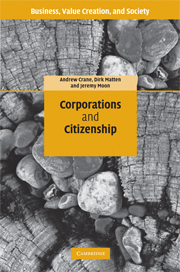Book contents
- Frontmatter
- Contents
- List of figures
- List of tables
- Foreword
- Preface
- Acknowledgements
- 1 Introducing corporations and citizenship
- Part A Corporations and citizenship relationships
- Part B Corporations and citizenship reconfigurations
- 5 Citizenship identities and the corporation
- 6 Citizenship ecologies and the corporation
- 7 Citizenship, globalization and the corporation
- 8 Conclusion
- References
- Index
6 - Citizenship ecologies and the corporation
Published online by Cambridge University Press: 22 September 2009
- Frontmatter
- Contents
- List of figures
- List of tables
- Foreword
- Preface
- Acknowledgements
- 1 Introducing corporations and citizenship
- Part A Corporations and citizenship relationships
- Part B Corporations and citizenship reconfigurations
- 5 Citizenship identities and the corporation
- 6 Citizenship ecologies and the corporation
- 7 Citizenship, globalization and the corporation
- 8 Conclusion
- References
- Index
Summary
Free trade as freedom for corporations is based on the forced alienation of rights to land, water and biodiversity that common citizens hold as a birthright.
Vandana Shiva, ‘How free is free India?’, Resurgence Magazine, June 1997Introduction
In the last chapter, we saw how the corporation had been involved in the reconfiguration of citizenship around identity. In this chapter, we continue this exploration of the role of corporations in alternative forms of citizenship by focusing specifically on ecological ideas of citizenship. Such notions have been percolating in and around the environmental studies literature and in debates about citizenship for some time now, but are far less developed than identity based concepts or, as we shall see in the following chapter, cosmopolitan ideas of global citizenship. That said, ecological perspectives on citizenship draw from and contribute to both of these other sets of ideas, without being subsumed by either. Therefore, there is clearly something of a distinctive literature, or more accurately a set of related literatures on citizenship that are specific to the ecological domain, and it is these literatures that we shall explore here in order to outline some further thoughts on the corporation and citizenship.
Although the literature dealing with ecological perspectives on citizenship is less developed than for our other two reconfigurations (identity and globalization), we have chosen to dedicate a chapter to the ecological perspective here mainly because environmental issues constitute such a major part of the debate on corporate power and responsibility.
- Type
- Chapter
- Information
- Corporations and Citizenship , pp. 149 - 168Publisher: Cambridge University PressPrint publication year: 2008

